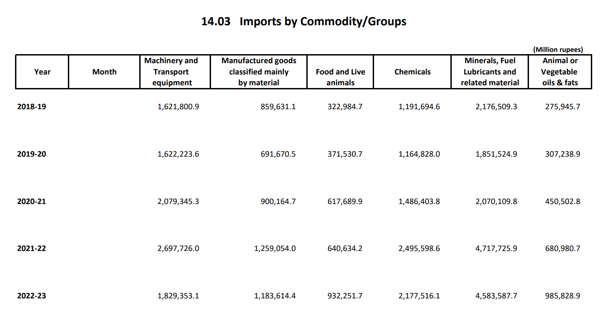INP-WealthPk
Muneeb ur Rehman
Pakistan is among the countries classified as net importers of food items. With a population of over 240 million, ensuring food security in the country necessitates a relaxed regulatory regime that promotes seamless cross-border trade. Talking to WealthPK, Faiz Rasool, senior policy adviser at Global Alliance for Improved Nutrition (GAINS), a non-profit foundation based in Geneva, Switzerland, said that the need for free trade in food items had become all the more for Pakistan because of the lack of food supplies in proportion to its population. “Pakistan has a population of 241.49 million as per the population census of 2023, which constitutes almost 2.4% of the global population.
The trade barriers in Pakistan are rooted in the underlying issue of the balance of payment crisis,” he mentioned. “Dwindling foreign exchange reserves and strained relations with the IMF are forcing the country to rely on a regulated trade regime. Tariff and non-tariff barriers to trade thereby affect the country’s ability to ensure food security through imports,” he said. The table below shows that the import of food items, including animal fats, vegetables, live animals, and cooking oils, has shown an increasing trend over the last few years.

Source: Pakistan Bureau of Statistics (PBS)
“In this context, the solution lies not in trade restrictions but in the modernisation of the agriculture sector in addition to introducing policy incentives for boosting food crops,” Rasool added. “A free regulatory trade regime will allow for diverse sources of food imports. This diversification will minimise dependence on a single source, reducing the risk of supply disruptions due to geopolitical or climatic factors,” the policy analyst noted. Rasool pointed out that an open trade environment encouraged competition among domestic and international suppliers. “Increased competition can lead to improved efficiency, innovation and lower prices, making food more accessible to the people of Pakistan.” “Access to a wider international market,” he underscored, could help stabilise food prices domestically.
“In times of domestic scarcity, imports can help meet demand, thus preventing sharp price increases.” While highlighting the importance of a free trade regime on foreign direct investment in the country, he said such a move would attract FDI in the agricultural sector. “This investment will bring in capital, technology and expertise, contributing to increased agricultural productivity and overall food security.” In summary, a free regulatory trade regime can enhance food security in Pakistan by promoting competition, diversifying sources of food, facilitating technology transfer, stabilising prices, mitigating risks, attracting foreign investment and providing access to a broader range of food products.
Credit: INP-WealthPk













